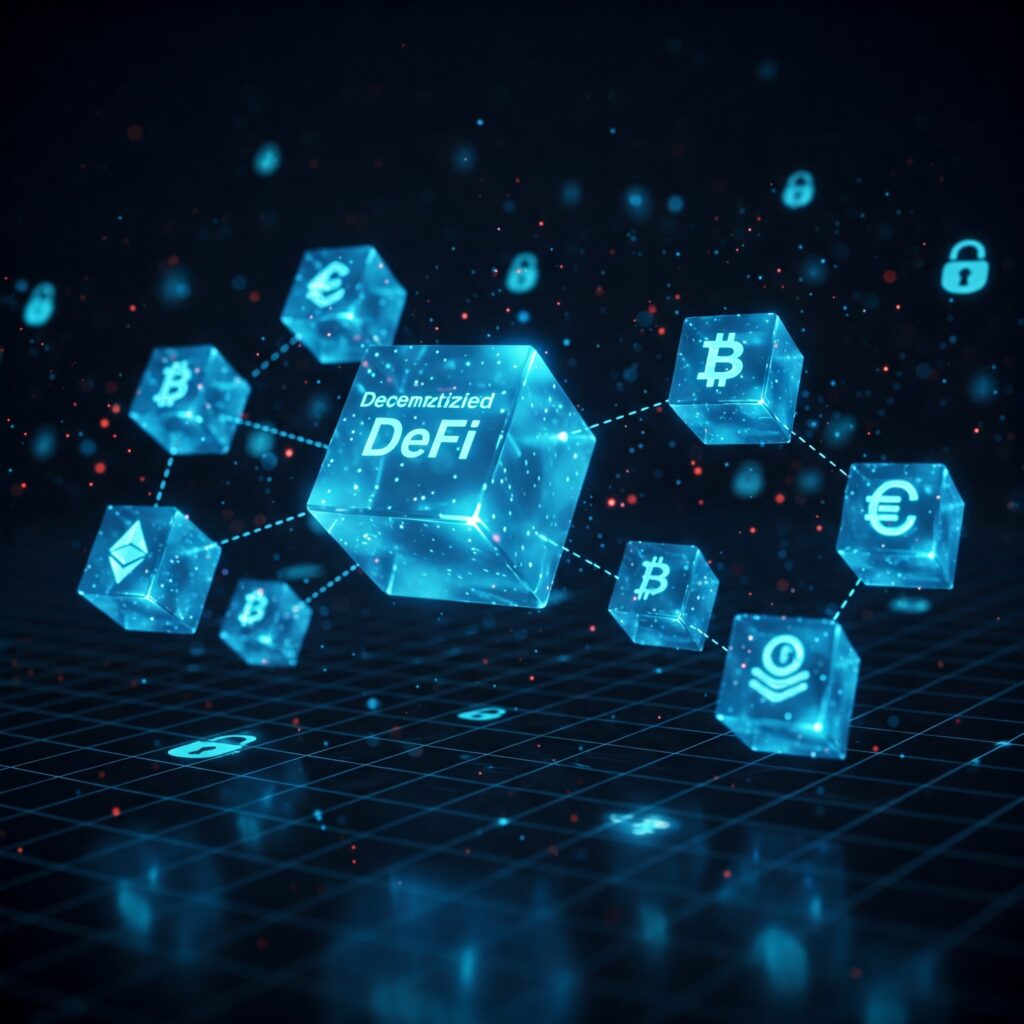What is Blockchain Technology? A Beginner’s Guide to Decentralized Finance (DeFi) & Cryptocurrencies

Introduction
Did you know that Bitcoin, the first cryptocurrency, was created in 2009 as an alternative to traditional financial systems? Since then, blockchain technology has revolutionized the world of finance, leading to the rise of decentralized finance (DeFi). But what exactly is blockchain, and how does it relate to cryptocurrencies and DeFi?
In this beginner-friendly guide, we will break down blockchain technology, its importance, key benefits, how it works, common challenges, and future trends. Whether you’re completely new to crypto or looking to deepen your understanding, this article will help you navigate the exciting world of decentralized finance.

Understanding Blockchain Technology
What is Blockchain?
Blockchain is a digital ledger that records transactions across multiple computers in a secure, transparent, and tamper-proof manner. Unlike traditional databases, which are controlled by a central authority, blockchain operates on a decentralized network.
Why is Blockchain Important?
- It eliminates the need for intermediaries like banks and payment processors.
- It provides greater security, transparency, and efficiency in transactions.
- It powers cryptocurrencies like Bitcoin and Ethereum, as well as DeFi applications.
Real-World Examples of Blockchain Use
- Cryptocurrencies: Bitcoin and Ethereum use blockchain to enable secure peer-to-peer transactions.
- Supply Chain Management: Companies like Walmart use blockchain to track products from origin to store.
- Smart Contracts: Platforms like Ethereum allow automated, self-executing agreements without intermediaries.
Key Benefits of Blockchain Technology
1. Decentralization
Unlike traditional finance, where a central authority controls transactions, blockchain distributes power among network participants. This reduces the risk of fraud and censorship.
2. Transparency and Security
All transactions recorded on the blockchain are public and cannot be altered, making it one of the most secure systems in the world.
3. Cost-Effective Transactions
Blockchain transactions are faster and cheaper compared to bank transfers, especially for international payments.
4. Financial Inclusion
DeFi applications provide banking services to unbanked populations worldwide, allowing them to access loans, savings, and investments without a traditional bank account.
5. Smart Contracts
These are self-executing contracts with predefined rules written in code. Once conditions are met, the contract automatically executes, reducing paperwork and manual processing.
How Blockchain Works: A Step-by-Step Guide
1. Transaction Creation
When someone sends cryptocurrency, a transaction is created and sent to the blockchain network.
2. Verification by Nodes
Nodes (computers in the network) validate the transaction using consensus mechanisms like Proof of Work (PoW) or Proof of Stake (PoS).
3. Block Formation
Verified transactions are grouped into a block and added to the blockchain.
4. Cryptographic Security
Each block is secured using cryptography and linked to the previous block, making it nearly impossible to alter past transactions.
5. Final Confirmation
Once added to the blockchain, the transaction is complete and cannot be changed.
Expert Tips:
- Always store your cryptocurrency in a secure wallet to protect it from hacks.
- Use strong passwords and enable two-factor authentication (2FA) for extra security.
- Avoid sharing private keys with anyone.
Common Problems & Solutions in Blockchain Technology
1. Scalability Issues
- Problem: Blockchain networks can become slow as they grow.
- Solution: Layer 2 solutions like Lightning Network and Ethereum 2.0 improve transaction speed.
2. High Energy Consumption
- Problem: PoW mining consumes a lot of electricity.
- Solution: PoS and eco-friendly blockchains like Solana and Cardano reduce energy use.
3. Regulatory Uncertainty
- Problem: Governments are still figuring out how to regulate crypto and blockchain.
- Solution: Stay updated with local laws and use compliant platforms.
Future Trends in Blockchain & DeFi
1. Mass Adoption of Cryptocurrencies
More businesses and individuals are accepting crypto payments, increasing mainstream adoption.
2. Growth of DeFi Applications
Decentralized lending, staking, and yield farming are transforming the financial industry.
3. Integration with Artificial Intelligence (AI)
AI-powered smart contracts and blockchain automation are set to revolutionize industries.
4. Central Bank Digital Currencies (CBDCs)
Governments are developing digital currencies like China’s Digital Yuan, which could shape the future of finance.
5. NFTs and Web3 Innovations
Non-fungible tokens (NFTs) and the metaverse are expanding blockchain applications beyond finance.
Conclusion & Final Thoughts
Blockchain technology and DeFi are reshaping the financial world by offering transparency, security, and financial inclusion. Whether you are investing in cryptocurrencies, using smart contracts, or exploring decentralized applications, understanding blockchain is crucial.
Final Tip: Always do your research before investing or using DeFi applications. Stay informed and secure your assets!
Frequently Asked Questions (FAQ)
1. What is blockchain in simple words?
Blockchain is a digital ledger that records transactions securely and transparently without a central authority.
2. How does blockchain relate to cryptocurrencies?
Blockchain is the underlying technology that powers cryptocurrencies like Bitcoin and Ethereum, enabling secure peer-to-peer transactions.
3. What are the main benefits of DeFi?
DeFi provides decentralized financial services like lending, borrowing, and trading without traditional banks.
4. Is blockchain technology safe?
Yes, blockchain is highly secure due to its decentralized and cryptographic nature, making it difficult to alter or hack transactions.
5. How can I start using blockchain and DeFi?
You can start by creating a crypto wallet, buying cryptocurrency, and exploring DeFi platforms like Uniswap, Aave, and Compound.